The Second World Conference on Arts Education
第2回 ユネスコ芸術教育世界会議
|
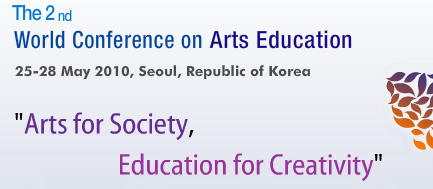
Seoul Agenda: Goals for the Development of Arts Education
Revised version 24 May 2010
ソウル議題:芸術教育発展のゴール
2010年5月24日 改訂版
|
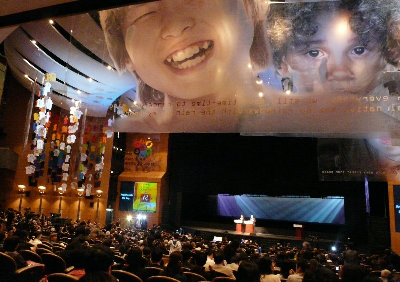
ロードマップから芸術教育のゴールへ
第1回芸術教育世界会議(2006年3月6-9日、ポルトガル、リスボンにて)での討議を基本にRoadmap for Arts Education(「芸術教育のためのロードマップ」)が作成され、様々な国に配布されて国家レベルで導入するよう推奨されている。ロードマップは基本的にすべての関係者が芸術教育の本質的役割を同じく理解する事を促し、政策主導の芸術教育導入を推奨することによって芸術教育の重要性に関する同意を形成するためにデザインされている。
これまでのロードマップの影響と効果は、その国家レベルでの導入に関してユネスコが実施した調査によって実証されており、この調査の結果は第2回芸術教育世界会議(2010年5月25-28日、韓国、ソウルにて)において公開されることになっている。
第2回芸術教育世界会議は、新しい世界的なディスカッションと芸術教育に関する重要な考え方のための基礎構築という役割を強く担い、継続的に発展する社会に必要な変化と機会を描き出そうとしている。これらの具体的な変容と現在と未来の社会の要請に応えるため、芸術教育はまず直面している主要な発展上の難題に対応しなければならない。
ロードマップが芸術教育への共通の理解をもたらすという役割を果たすとすれば、その結果として国際社会は、最新の芸術教育を更に調査し予想される難題を探究するための明確なビジョンを伝えるしっかりした計画を期待するであろう。提案されたDevelopment Goals of/for Arts Education(「芸術教育の、芸術教育のための、発展目標」)はそのようなビジョン的目的を表しており、この目的はこの分野における将来の決定やしっかりとした戦略のための実用的なベンチマークとして機能することが期待されている。
第2回芸術教育世界会議は第1回の反復ではないので、Development Goalsはロードマップの複製ではない。それはロードマップの効果と遺産を否定するのではなく、創造的で文化的意識がある社会を構築するために、政策主導の目的においてロードマップが成し遂げた結果を再び活性化し、芸術教育の重要性の基礎となるその観点を確認するものである。
同時に、バランスのとれた個人と統合された社会を構築する上ですべての社会的勢力をもっと活発に支援する必要性を認識することにおいて、Development Goalsは、よりしっかりとした行動への出発点として、また芸術教育が目指すべき発展の長期的目的に言及するものとして機能する。Development Goalsは主に国際社会に対して芸術教育発展への活発な関与と真剣な取り組みの重要性を訴え、従ってそれは芸術教育コミュニティーに将来を計画し行動を起こさせる、行動重視の書類として提示さる。
Development
Goalsは(第2回世界会議期間中に)世界的なパートナーシップと国際的な芸術教育コミュニティーが行っている取り組みを通して達成することができる行動の優先順位を明らかにした上でいくつかの同意された目標として作られる。ユネスコは、パートナーやコミュニティーと同じく加盟国に、戦略を練り様々な環境に上質な芸術教育を導入する時に、その目標を受け入れるよう推奨するであろう。
2009年7月に第2回世界会議に備えるためユネスコ本部で行われたInternational Advisory Committee(IAC)(国際諮問委員会)ミーティングでのディスカッションに関連し、これら目標の当初案を示す第1版が起草され、さらなる諮問のため委員会メンバーに配布された。
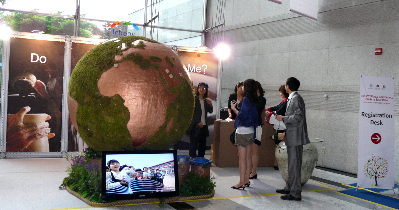
意見交換の主なツールとして会議開始時に提示する事を念頭に、IACメンバーのコメントや提案を考慮した第2版が会議期間中の2010年5月24日に完成した。
Development
Goalsを考える上の出発点は主に芸術教育発展の世界的課題として提示されている次の問題に対応している。
− 包含
− バランスと公平
− 持続可能性
− 文化的多様性
そのような行動において留意すべきは次の点である。
− 鼓吹と政策による支援
− パートナーシップと協力
− 能力開発研究と評価
Goalsを包含する一般的考察がメンバーによって提唱され、これは序文の主要要素となろう。
− 新しい教育パラダイムの基礎として芸術教育を定義し促進する
− 社会文化的なアプローチと価値の重要性を強調する
− 教育学的、社会文化的な文化の重要性を再統合する
− 芸術教育における学際的なプラクティスを促す
− フォーマルな教育、インフォーマルな教育、コミュニティー教育の間の結びつきを確立する
− 芸術教育強調のための市民社会、政府、高レベルの教育機関の努力を表現する
− 地域的特殊性を考慮する
− 芸術教育の強力な鼓吹ツールである創造的で革新的な技術を考慮する
具体的な提案は以下の2つである。
− 芸術教育の持続可能性を促進するために国際的な研究ネットワークを構築する
− 芸術教育鼓吹のための国際的な手引きを作り上げる
最後に、Goalsに次のような主文が提案されている。これらはIACメンバーが希望したとおりいくつかの目標を伴っている。
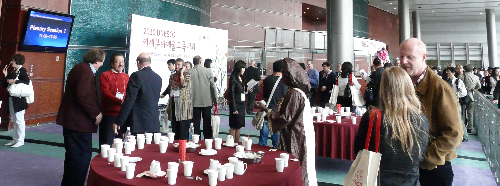
1.芸術教育をバランスのとれた認識的、感情的、審美的なこどもと若者の社会発展の基礎として確認する
目標:
i) すべてのレベルの学校のすべての学生に、広汎な教育の一部として包括的でバランスのとれた芸術研究へのアクセスを提供する
ii)
レッスン計画に芸術体験の創造的な特性を取り入れる
iii)
バランスのとれた発育のための良質な評価手法を開発する
2.学校内外の芸術体験と芸術家とのコラボレーションを含む芸術教育を強化する
目標:
i) たとえば、自己表現としての芸術、知識への道としての芸術、修養としての芸術、など、芸術を学校レベルによって取り扱う。さらに、学校における芸術教育を学校外の教育プログラムや芸術家の参加を得て開発する。
ii)
学校での活動と関連する学校外の芸術教育のスキルと場所を開発する
iii)
親とコミュニティーが活動に参加する
3.教育者と芸術家のコミュニティーに持続できる芸術教育トレーニングを与える
目標:
i)
持続可能なトレーニングの仕組みを構築する
ii)
芸術用語を事前教職教育のなかに統合し、その導入を確実にするため指導する
iii)
導入を確実にするため監督や指導といった良質のモニター制度を開発する
4.芸術教育における、またそれに関する生涯学習を促進、育成する
目標:
i)
積極的な経験と芸術との良好で生涯にわたる関係を提供する
ii)
人々の文化生活を高めるため良質な芸術教育の生涯学習を促進する
5.芸術教育の社会文化的な健康という特質を認識し発展させる
目標:
i)
広汎な伝統的、現代的な芸術経験の価値を認識する
ii)
社会文化的な健康を様々な形の芸術教育トレーニングに統合する
iii)
芸術教育の社会文化的な療法的、健康的特質を探る
6.社会的責任、社会一体性、文化的多様性、文化間対話の促進における芸術教育の役割を支持し強調する
目標:
i)
学習者特有の状況の経験と包含に優先順位を付ける
ii)
多用な文化的芸術的表現のより良い知識と理解を提供する
iii)
教育者トレーニング、教育学、設備や教育器具の支援を提供する多文化的芸術教育を開発する
7.平和から持続可能性に至る主要な世界的課題に対応するため芸術教育を通して能力を育成する
目標:
i)
異なる文化に接するように生徒と教育者の機動性を増加させる
ii)
芸術教育カリキュラムの世界的な特質を拡大する
iii) 民主主義、グローバル市民権、文化的多様性を支持し良質な教育における芸術の影響を強化する
8.芸術教育のリーダーシップ、鼓吹、政策立案プロセスのための能力を構築する
目標:
i) 芸術教育鼓吹と政策リフォームのための実務者と研究者の能力を構築する
ii) 敏感化と動機付けの方法として芸術の個人的、社会的役割を発展させる
iii) メディアと芸術教育との関係を強化し、適切なコミュニケーション言語を構築する
9.様々な関係者、部門、文化、産業の間の多様な芸術教育パートナーシップを発展させる
目標:
i) 政府、教育・文化部門、国、文化産業内、あるいはそれらを超える、社会における芸術教育の役割を強化するパートナーシップを築く
ii) 芸術教育の原理、政策、行動を強化するため、民間の社会的団体、政府、高等教育機関の努力をコーディネートする
iii) 教育、文化、コミュニケーション部門の間の多国間協力を特に基金や産業を通して促進する
10.芸術教育の理論、研究、実務の間の対話と交換を刺激する
目標:
i) 芸術研究を世界的に支援し、芸術教育における研究と実務を結びつける
ii) 情報センターあるいは監視所のような団体を通して芸術教育実務をシステム化し促進する
iii) 芸術教育の影響に関する良質の証拠を統合する
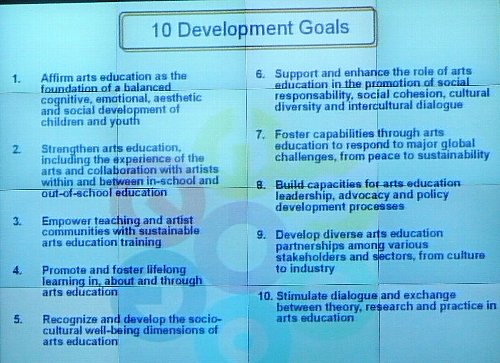
10 Development Goals :ソウル大会でのプレゼンシート
(原文)
◆From the Road Map to Arts Education Development Goals
Drawn up on the basis of deliberations undertaken during the First World
Conference on Arts Educatlon (6-9 March 2006,Lisbon,Portugal),the“Road Map
for Arts Education”was produced and distributed to different countries encouraging its
implementation at national level.
The Road Map is especially designed to promote a common understanding among all
stakeholders of the essential role of arts education and to develop a consensus
on the importance of arts education by providing policy-guiding recommendations
implementing arts educatlon.
The impact and the effectiveness of the Road Map has since been verified
through the survey that was conducted by UNESCO on its implementation at
country level,whlch results will be presented at the Second World Conference
on Arts Education(25-28 May 2010, Seoul,Repubic of Korea).
The Second World Conference on Arts Education is ever committed to building
a foundation for renewed global discussions and critical perspectives on
arts education,outlining changes and opportunities needed for continously
evolving societies. ln order to respond to these concrete transformations
and requirements of current and future societies,arts education should first reflect on the main development
challenges it faces.
lf the Road Map has played its role in introducing a common ground of understanding
on arts education,consequent expectations from the international community
would be to have a solid plan, which communicates a clear vision to further
examine the state-of-the-art of arts education and to explore its prospective
challenges. The proposed Development Goals of/for Arts Education represent
such visionary aims,which are expected to serve as practical benchmarks
for future decisions and concrete strategies for actions in this field.
As the Second World Conference will not be a repetition of the FIrst,the
Development Goals will not be a duplication of the Road Map. However,as
opposed to denying the effects and the legacy of the Road Map,it will revitalize
the results that the Road Map has achieved in sharing its policy-guiding
objective and confirm its standpoint underlining the importance of arts
education for building a creative and culturally aware society.
At the same time,the Development Goals will,in recognizing the need to
assist all forces of society more actively in the common goal of building
balanced individuals and integrated societies,serve as a point of departure
to more concrete actions and as a reference to what long term development
objectives arts education should aim at. lt will primarily address to the
international community the significance of active engagement and serious
commitment to arts education development and, therefore,is presented as
an action-oriented document that mobilizes the arts education community
to plan the future and pursue action.
The Development Goals will be established as an agreed set of goals (during
the Second World Conference)after identifylng priorities for action,which
can be achieved through the global partnership and ongoing commitment of
the international arts education community. UNESCO will recommend to its
Member States as well as its partners and communities to accept the goals
when elaborating strategies and implementing quality arts education throughout
various environments.
The first version of the current paper providing the initial reflection
of these goals was drafted with reference to the discussions held during
the lnternational Advisory Committee(IAC)Meeting that took place in July
2009 at UNESCO Headquarters to prepare the Second World Conference. lt
was submitted to the members of the same Committee for further consultation.
A second version taking into account the comments and proposals received
from the members of the lAC was finalized during a meeting on the 24th
of May 2010,with a view to being presented at the opening of the Conference
as a main tool for exchanges.
The starting point of consideration for the Development Goals corresponds
to the following issues that have been chiefly raised as global challenges
for the development of arts education:
− Inclusion
− Balance and Equity
− Networking
− Sustainability
− Cultural diversity
Along with such actions to bear in mind:
− Advocacy and policy support
− Partnership and Cooperation
− Capacity building Research and evaluation
Some general considerations encompassing the Goals were put forward by
the members and may constitute the main elements of a preamble:
- Define and promote arts education as the foundation of a new paradigm
of education
- Stress the importance of socio-cultural approaches and values
- Reintegrate the pedagogical and socio-economic importance of culture
- Encourage interdisciplinary practices in arts education
- Establish links between formal, informal and community education
- Articulate efforts from civil society,governments and high level training
institutions for reinforcing arts education
- Consider regional and local specificities
- Take into account creative and innovative technologies,a powerful advocacy
tool for arts education
As well as two concrete proposals:
- Establish international research networks to promote the sustainability
of arts education
- Elaborate an international guide for arts education advocacy
Finally, the following main lines are proposed for the Goals. They are
complemented with some targets as requested by the lAC members:
1. Affirm arts education as the foundation of a balanced cognitive, emotional,
aesthetic and social development of children and youth
Targets:
i)Give access to comprehensive and balanced studies in the arts to all
students at all levels of schooling as part of a broad education
ii)Include the creative qualities of arts experiences in lesson plans
iii)Develop systems of quality evaluation in order to ensure balanced
development
2. Strengthen arts education, including the experience of the arts and
collaboration with artists within and between in‐school and out‐of-school
education
Targets:
i)Treat arts at various school levels differently,for example arts as
self-expression,arts as a way to knowledge,arts as a discipline,etc.
Furthermore,develop arts education within schools in collaboration with
out-of-school training programmes and with the participation of artists.
ii)Develop skills and places for arts education outside schools in relation
to school activities
iii)Actively involve parents and communities
3. Empower teaching and artist communities with sustainable arts education
training
Targets:
i)Establish sustainable training mechanisms
ii)Integrate artistic language within pre-service teacher education and
the professional development of practicing teachers
iii)Develop systems of quality monitoring such as supervision and mentors
in order to ensure its implementation
4. Promote and foster lifelong learning in, about and through arts education
Targets:
i)Offer positive experiences and good lifelong relations to arts
ii)Promote lifelong learning of quality arts education to enhance the
cultural life of people
5. Recognize and develop the socio‐cultural well-being dimensions of arts
education
Targets:
i)Recognize the value of a full range of traditional and contemporary arts
experiences
ii)Integrate socio-cultural well-being into the various forms of arts
education training
iii)Cultivate the socio-cultural therapeutic and health dimensions of arts
education
6. Support and enhance the role of arts education in the promotion of
social responsibility, social cohesion, cultura diversity and intercultural
dialogue
Targets:
i) Prioritize the experience and inclusion of the learner-specific context
ii)Provide access to better knowledge and understanding of diverse cultural
and artistic expressions
iii)Develop multicultural arts education with the necessary support of
teacher training,pedagogy, equipment and teaching materials
7. Foster capabilities through arts education to respond to maior global
challenges, from peace to sustainability
Targets:
i)Increase mobility of students and teachers in encounters with different
cultures
ii)Enlarge global dimensions in the curriculum of arts education
iii)Reinforce the impact of the arts in quality education,in favor of democracy, global citizenship and cultural diversity
8. Build capacities for arts educatin leadership, advocacy and policy
development processes
Targets:
i)Build practitioners and researchers' capacities for arts education
advocacy and policy reform
ii)Develop the individual and social role of arts as ways of sensitization
and motivation
iii)Reinforce relations between the media and arts education and establish an
appropriate language for communication
9. Develop diverse arts education partnerships among various
stakeholders and sectors, from culture to industry
Targets:
i)Build partnerships within and beyond governments,educational and cultural sectors,communities and cultural industries that will
strengthen the role of arts education in society
ii)Coordinate the efforts of civil society organizations, governments
and higher education institutions to strengthen principles,policies and actions
of arts education
iii)Promote multilateral cooperation between education,culture and communication
sectors,notably through foundations and industries.
10. Stimulate dialogue and exchange between theory, research and practice in arts education
Targets:
i)Support arts research globally and link research and practice in arts
education
ii)Systemize and promote arts education practices through clearing houses
or bodies such as observatories
iii)Consolidate the quality of evidence of the impact of arts education
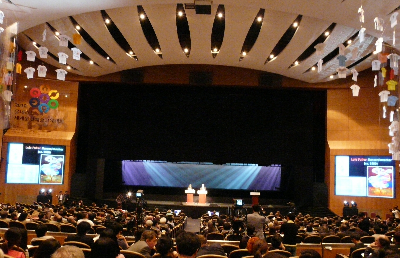
The Second World Conference on Arts Education 第2回芸術教育世界会議
|
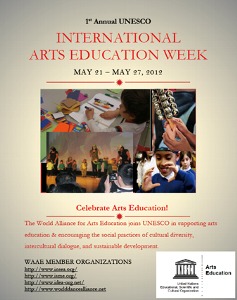
芸術教育(ソウル、2010年)に関する第2回世界会議の成功に続いて、ユネスコの一般会議は2011年の36番目の会期に於いて、5月の第4週間目を国際芸術教育週間として宣言しました。
2012年5月21日から27日の週が、今年の国際芸術教育週間になります。
|